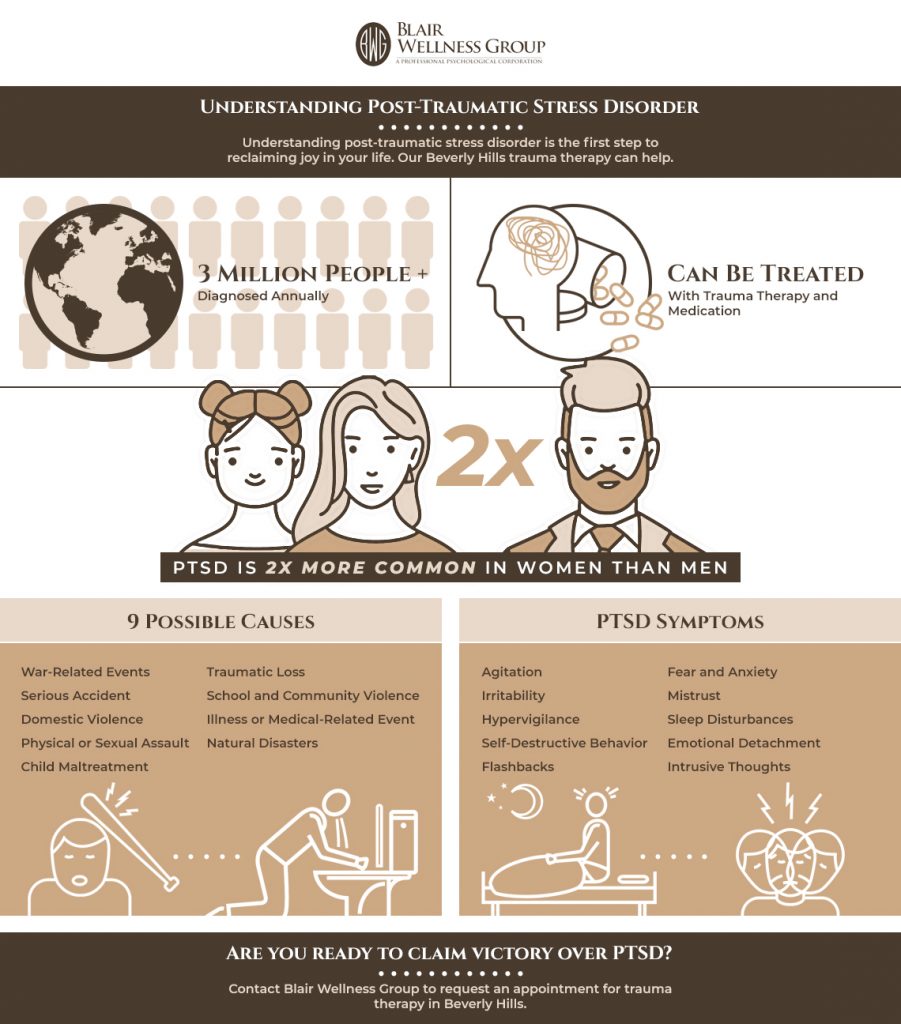It goes without saying that life isn’t always smooth sailing. Events sometimes take place that can completely change the trajectory of our lives — some are for the better, but others can leave a lasting imprint on an individual’s mental health. Traumatic events have the capacity to rob people of their joy, holding them hostage as they continue to live in the moment of the traumatic event. At Blair Wellness Group, we offer concierge-style counseling services including trauma treatment in Beverly Hills that helps individuals move beyond their trauma, allowing them to reclaim the joy in their lives. Check out different trauma classifications, types, and symptoms below and request your appointment with Dr. Blair today.
Classifications of Trauma
Many people mistakenly think that trauma is trauma. In reality, there are three distinct classifications of trauma:
- Acute: Results from a single incident
- Chronic: Results from repeated or prolonged trauma (i.e. domestic violence)
- Complex: Results from exposure to various multiple traumatic events within specific relationships and contexts (i.e. child abuse)
Understanding these as they pertain to the traumatic event(s) that you are working to overcome can be beneficial to your trauma treatment.
9 Types of Trauma
War-Related
Combat is not only physically dangerous, but it is mentally dangerous as well. Wartime combat can leave an individual grappling with post-traumatic stress disorder (PTSD), as can exposure to political violence, torture, terrorism, and other war-related circumstances.
Accident-Related
Being involved in any type of serious accident can lead to lasting trauma. This is especially true if the accident resulted in serious injury. Even those who witness a serious accident or treat a patient following one may suffer from secondary trauma.
Domestic Violence
Whether threatened or actual, domestic violence can be damaging to an individual’s mental well-being. This violence may be physical, sexual, or emotional in nature and because it occurs within the confines of an intimate relationship, it is considered a type of complex trauma.
Physical and Sexual Assault
Being attacked either physically or sexually is traumatic for many reasons, but primarily because an individual’s right to safety has been violated. These types of assault include events like rape, harassment, and violent attacks.
Child Maltreatment

Neglect, physical abuse, sexual abuse, and psychological abuse are all types of traumatic child maltreatment. Like domestic violence, it is considered a type of complex violence because of its invasive, interpersonal aspects.
Traumatic Loss
Many individuals struggle with the trauma that comes from losing someone important in their lives, such as a parent, child, or spouse. This type of trauma is often complicated if the death was sudden and unexpected.
School and Community Violence
Children who have been involved in a school shooting may struggle with trauma, as may individuals who have been exposed to acts of community violence like robberies. Repeated exposure to media coverage of these events can even lead to secondary trauma for some.
Illness and Medical
Many individuals can have a traumatic reaction following an unexpected or extended illness. Likewise, traumatic reactions can also be caused by invasive medical procedures used during the course of treatment.
Natural Disasters
Hurricanes, earthquakes, tornadoes, and other catastrophic events can trigger a trauma response in individuals. This response may be compounded if paired with another type of trauma, such as losing a loved one in the event.
Symptoms of Post-Traumatic Stress Disorder
Post-traumatic stress disorder (PTSD) is a disorder in which a person has a hard time recovering emotionally after they have experienced or witnessed a traumatic event. PTSD affects about 3.5% of adults in the United States and has a wide variety of symptoms.
Psychologically, an individual may experience flashbacks to the event and suffer intense fear, anxiety, and mistrust. They may be easily agitated, irritable, hostile, or exhibit other uncharacteristic behaviors. Many individuals experience mood shifts, including feeling guilty, lonely, or losing interest in things they used to enjoy. Sleep disturbances, unwanted thoughts, and emotional detachment are also symptoms of PTSD.
Trauma Treatment in Beverly Hills, Irvine, and Newport Beach
It can be difficult to discuss traumatic events. The good news is that trauma Treatment and other counseling services can help you pick up the pieces and move on with your life. Blair Wellness Group is here to help you break free from the chains of trauma so that you can experience joy in your life again. Contact Dr. Blair today to request your appointment with an experienced psychologist.
Dr. Cassidy Blair is a renowned Licensed Clinical Psychologist and trusted Performance Coach who specializes in providing Concierge-Psychological Care and Executive Coaching for high-achieving professionals. With a deep understanding of the unique challenges faced by CEOs, executives, entrepreneurs, and leaders, Dr. Blair offers tailored, confidential care designed to foster emotional well-being, personal growth, and professional excellence. Her clientele values her discretion, clinical expertise, and emotionally intelligent approach to navigating complex personal and professional dynamics.
- This author does not have any more posts.





